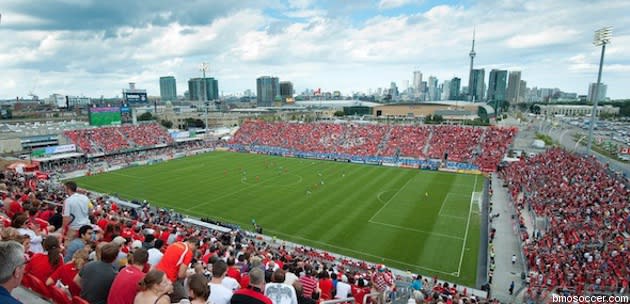BMO Field expansion endorsed by Toronto council, making Argos’ new home a step closer
The Toronto Argonauts' decade-plus search for a new stadium appears to be drawing to a close. Thursday saw Toronto city council vote 39-3 in favour of loaning Maple Leaf Sports and Entertainment $10 million to help with the estimated $120 million cost of renovations, a deal previously approved by the Exhibition Place board and the council's executive committee. A crucial part of the planned renovation involves expanding the stadium so a Canadian football field can fit inside and striking a lease deal with the Argonauts. (Funnily enough, two of the three dissenters were Mayor Rob Ford and Councillor Doug Ford; the mayor's affinity for the Argonautsand football doesn't appear to have come into play here despite his previously-stated support for finding them a new building.) Thus, if the deal goes through, the team should have a new home. All that remains is for the remaining $20 million in funding (MLSE is putting in $90 million) to be found.
That money is expected to come from provincial and federal government coffers, but there hasn't been much discussion of how likely that is just yet. It's certainly possible; after all, both of those levels of government contributed over $90 million (combined) to build a new stadium just down the road for the Hamilton Tiger-Cats. However, that was a new stadium rather than renovations, and much of the funding there came through the Pan-Am Games process. MLSE president Tim Leiweke did mention the Pan-Am Games (held in Toronto in July 2015) in his remarks to council Thursday, so it's possible the renovations could be done by then and the stadium could be used for that, which might help motivate the federal and provincial governments to pitch in.
A big question is what the expanded field will be like for soccer, though. There are still discussions about just what kind of a surface will be used, and MLSE's messaging on the subject has ranged from "we're committed to grass" to "a hybrid playing surface — natural grass combined with artificial fibres" to retaining natural grass and expecting "six to seven days to ensure that field is back in great shape for soccer." That scheduling is probably infeasible, so some form of hybrid surface seems likely, but while it would stand up better to the pounding from football, it's not as desirable for soccer. MLSE-owned Toronto FC probably can't lodge too many complaints here (although their fans will), but making the stadium less suitable for high-level soccer may not appeal to the provincial and federal governments.
Of course, there's always the possibility of putting in pure grass for big events (such as the Canadian Soccer Association's plan to bid for the 2026 World Cup), which has been done in stadiums like Seattle's CenturyLink Field. That isn't always a perfect solution either, though, as single-event grass isn't as solidly anchored and can be slippery. The surface debate seems unlikely to keep the Argos out at this point, as both MLSE and the city of Toronto are making their inclusion key parts of this deal. However, the surface discussion could make provincial and federal funding tougher to come by. We'll see what those levels of government decide. At this point, enough hurdles have been cleared that the Argos-to-BMO plan is looking more and more likely, but it isn't a fait accompli just yet.

 Yahoo Sports
Yahoo Sports 


